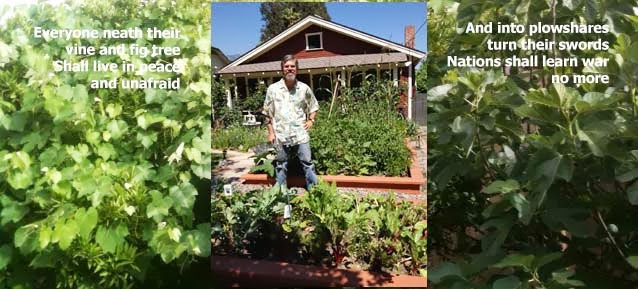 Today I will be giving the closing benediction at the "Not in God's Name" Conference. I wasn't sure what to say or do until the Spirit knocked on my door twice this week. First, a friend from my men's group sent me a prophecy attributed to a Hopi elder, and on Friday, an Episcopal monk read the same prophecy at the Community of Divine Love community service. It struck me that we didn't have a Native American voice at the Conference, and that if we were going to talk about violence and religion, we needed to acknowledge the horrendous violence that Christians have perpetrated on native people and the earth through the so-called "Doctrine of Discovery." The Hopi prophecy is a good reminder that we can't put our faith in leaders, we need to put our faith the the divine wisdom that the Great Spirit has implanted in our hearts. I especially like the Hopi proverb: "Wisdom comes only when we stop looking for wisdom and start doing what the Creator intended for us." My hope and prayer for this Conference is that it inspires us to redouble our efforts to be interfaith peacemakers.
Today I will be giving the closing benediction at the "Not in God's Name" Conference. I wasn't sure what to say or do until the Spirit knocked on my door twice this week. First, a friend from my men's group sent me a prophecy attributed to a Hopi elder, and on Friday, an Episcopal monk read the same prophecy at the Community of Divine Love community service. It struck me that we didn't have a Native American voice at the Conference, and that if we were going to talk about violence and religion, we needed to acknowledge the horrendous violence that Christians have perpetrated on native people and the earth through the so-called "Doctrine of Discovery." The Hopi prophecy is a good reminder that we can't put our faith in leaders, we need to put our faith the the divine wisdom that the Great Spirit has implanted in our hearts. I especially like the Hopi proverb: "Wisdom comes only when we stop looking for wisdom and start doing what the Creator intended for us." My hope and prayer for this Conference is that it inspires us to redouble our efforts to be interfaith peacemakers.
Friends, as we conclude our time together, let
us remember to honor the original stewards of this land, the Tongva people.
Let’s hold in our prayers the protectors of our mother, the earth, who are
trying to stop an oil pipeline from desecrating the traditional lands of the
Lakota. By the so-called “Doctrine of Discovery,” Christians have claimed that they
own the land that has been under the care of the Native People of this planet since
time immemorial, but traditional wisdom and the Bible teach us that the earth
and all its fullness belong to the Creator. Much blood has been shed over land
in order to extract resources and this violence needs to end. Let’s conclude
our conference by recalling a prophecy that has been attributed to Hopi
elders.
"You have been telling the people that this
is the Eleventh Hour, now you must go back and tell the people that this is the
Hour. And there are things to be considered . . .
Where
are you living?
What are you doing?
What are your relationships?
Are you in right relation?
Where is your water?
Know your garden.
It is time to speak your Truth.
Create your community.
Be good to each other.
And do not look outside yourself for the leader."
What are you doing?
What are your relationships?
Are you in right relation?
Where is your water?
Know your garden.
It is time to speak your Truth.
Create your community.
Be good to each other.
And do not look outside yourself for the leader."
This could be a good time!"
"There is a river
flowing now very fast. It is so great and swift that there are those who
will be afraid. They will try to hold on to the shore. They
will feel they are torn apart and will suffer greatly.
"Know the river has its
destination. The elders say we must let go of the shore, push off into
the middle of the river, keep our eyes open, and our heads above
water. And I say, see who is in there with you and
celebrate. At this time in history, we are to take nothing personally,
Least of all ourselves. For the moment that we do, our spiritual
growth and journey comes to a halt.
"The time for the lone
wolf is over. Gather yourselves! Banish the word struggle from you
attitude and your vocabulary. All that we do now must be done in a sacred
manner and in celebration.
"We are the ones we've
been waiting for."
Let’s reflect on these
words in sacred silence and listen for the wisdom from within. Another proverb
of the Hopi tell us: Wisdom comes only when we stop looking for it and start
living the life the Creator intended for us. As we reflect in silence, let your
inner wisdom tell you what you need to do and if you feel led by Spirit,
briefly share what you intend to do as a result of this conference to foster
peace and harmony among people of different faiths.







